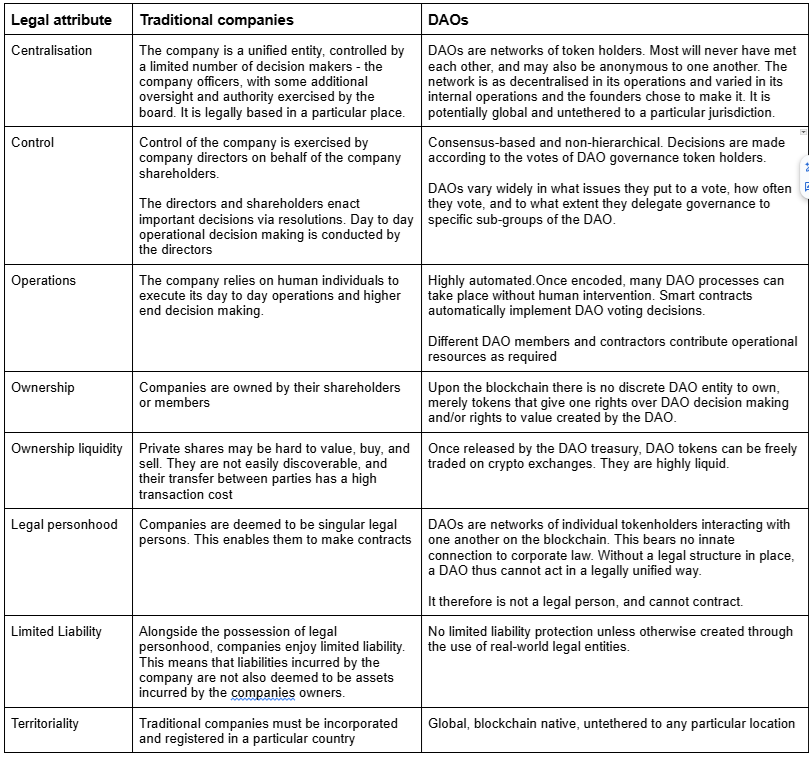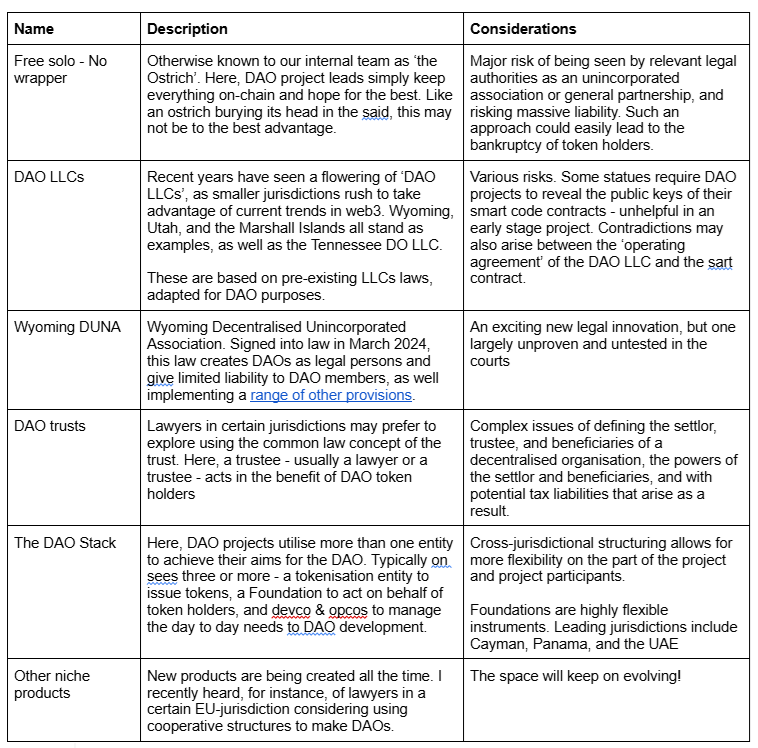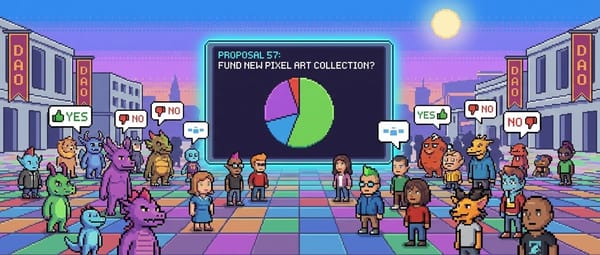DAOs - wrappers, stacks, and the law

DAOs and traditional legal systems
DAOs - decentralised autonomos organisations - are a crucial part of the web3 ecosystem. By operating as a DAO, blockchain-native organisations can operate in ways that lie beyond the possibilities of traditional corporate entities, opening up new possibilities of decentralized governance, control, ownership, and operational execution.
- Control and governance: DAOs enable highly flexible and decentralised control. In a traditional company, executives make decisions regarding the operations and future of the company. Shareholders have a range of rights and entitlements, but typically are kept at arms length from corporate decision making. In a DAO, by contrast, owners of DAO governance tokens can use their votes to support or resist a potentially very wide set of DAO decisions. There are no DAO directors; instead, there are just the decisions taken by DAO token owners.
- Automated execution: The operational execution of DAO decisions, meanwhile, does not depend on the actions and decision making of human agents, managers, or employees; when the DAO makes a decision it is fulfilled instead by the code-based rules of smart contracts. These trustless systems are therefore fundamentally unlike those of traditional companies.
- Improved liquidity: Unlike private company shares, DAO tokens are open and highly liquid, and can be bought and sold across centralised and decentralised exchanges.
- No ownership: In a well-structured DAO, no individual can be said to ‘own’ the organization; instead, ownership is expressed through owning the DAO’s tokens.
Given the above, it should come as little surprise to know that all this poses major challenges to traditional legal systems.
The traditional system
To be valid within the traditional legal world, a corporate form has a range of requirements. Notably, a corporation:
- Needs a corporate body: To sign contracts, indeed to get anything done, companies need to have their own legal personality separate from the individuals who constitute the company team. The property company that leases the office space of a DAO’s development team needs someone it can do business with in the pre-existing legal world of companies, owners, and employees - it can’t be expected to come on-chain or even to take payments in digital assets if it does not want to, and it needs to know that it has another party against which to create and enforce contracts.
- Requires territoriality: Companies are created according to the laws of a particular place. Alongside this, they must also be tied to a particular place, and need a physical address.
- Requires officers and owners: Traditional companies must also involve the familiar roles of owners, managers, and administrators. Limited companies and LLCs are owned by their shareholders or members, managed and led by the individual office-holders we call directors, and overseen from an administrative perspective by company secretaries.
DAOs and traditional companies compared
Note: Company laws vary between jurisdictions. The below table speaks to the high level differences between companies and DAOs as organisational forms.

How the law views DAOs
Bearing in mind the differences outlined above, common-law courts are not geared up to understand DAOs, as DAO stand outside corporate law as it has developed to date. Unless given good reasons not to do so, courts have tended to place DAOs within pre-existing legal regimes. In particular, they have tended to see DAOs as partnerships, thus conferring a range of liabilities upon DAO project participants.
United States
- Contrary to some views in the industry, not having a legal entity is no bar to being sued and / or subject to regulation. Last year USA courts found the Ookie DAO to be an ‘unincorporated corporation’, meaning that it was capable of being sued and being held liable for its failings. Courts have shown willingness to pursue individual DAO tokenholders for the failings of the DAO.
- In Sarcuni vs bZx DAO, a US court held that a DAO operated as a general partnership. This had the effect of meaning that DAO token holders were jointly and severally liable liable for the alleged failings of bZx DAO.
UK
- Using the example of the MakerDao as a ‘typical DAO’, one analyst concluded that under English law, the MakerDAO - or rather, the human communities that support it - could be classified as a form of partnership.
- This arises due to the activities of the DAO and the DAO Foundation. It’s helpful to dive a little into the detail to understand why
- MakerDAO operates the DAI stablecoin, and MKR governance tokens confer governance rights on token holders, as well as enabling them to gain value.
- Users generate DAI by depositing ETH in a ‘vault’, a smart contract that escrows collateral and keeps track of its USD value. The Vault holder then mints DAI up to a certain collateralization ratio depending on the collateralized asset, incurring a debt that must be repaid with interest.
- This DAI is sold on exchanges for fiat or crypto currency
- If the vault contract becomes undercollateralised, then “arbitrageurs, so called keepers, are incentivised to liquidate the contract with the Maker Protocol automatically triggering an auction of the collateral in exchange for DAI to repay the outstanding amount”
- Vaults are non-custodial
- Holders of MRK tokens vote on changes to and updates of the protocol as well as on the calibration of the risk parameters that determine the usage of the vaults
- The Maker Foundation, created the DAO but is is involved neither in the escrowing of collateral nor the issuing of DAI nor the triggering of tokens
- Even the most decentralised and automated of DAOs still require human intervention. Core developers may hold admin keys, governance tokens may be concentrated in the hands of a few owners, there may be a committee overseeing some dev work. Somewhere, there are humans involved in eeping the smart contracts running.
- In general, the law casts a wide net - a ‘firm’ can be an unincorporated group
- The Maker Foundation is a legal entity. The DAO itself may or may not be - in the absence of any additional legal structuring it would be up to national laws to decide how to treat the body of humans that are actually involved in the DAO
- It is therefore likely that the humans involved in the DAO are some form of partnership which may or may not have legal personality
France
- There are no specific DAO laws in France
- Creators of DAOs run the risk of creating a ‘de facto company.’ This is a concept in French law to cover situations where individuals have not drafted a company statute or registered the business, but nevertheless are acting as partners.
- France has a civil law system. Many French DAOs use the 1901 Law of Associations to create an either non-proft of commercial DAO entity. As an entity under the Law of Associations, the DAO has an independent identity. The article of association can be written to reflect the DAO’s rules
Germany
- Germany has no law on daos. As one commentator put it, DAOs are currently to be regarded as civil-law partnerships (Gesellschaft bürgerlichen Rechts (GbR)) or general partnerships (offene Handelsgesellschaft (OHG)) under German law. Some commentators consider DAOs to be unincorporated associations (nichtrechtsfähiger Verein), which are nevertheless subject to the provisions governing civil-law partnerships.
- Partners within a German general partnership have unlimited liability for the affairs of the firm. Unincorporated associations have unlimited liability; usings
In summary
Bearing in mind the prevailing uncertainty about DAOs in major jurisdictions, DAO project coordinators must therefore think seriously about the activities of their DAO, the best way to give it form, and the best way to protect the interest of DAO contributors and project leads.
Wrappers and Stacks - responses to the question of setting up DAOs
A few different ways have evolved among DAO projects for setting up their DAOs

In our view, what is needed is an entity stack - two, three or even more entities that will enable you and your colleagues to give off-chain legal effect to an on-chain DAO. The most popular entity stack to date is the Cayman Islands memberless foundation, followed by the Panamanian Foundation




